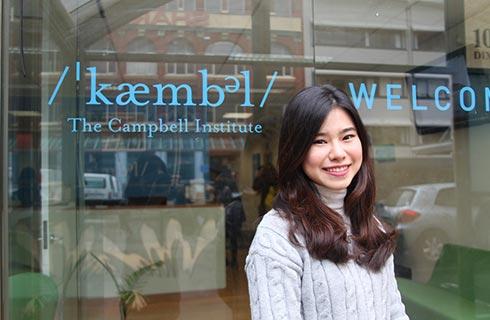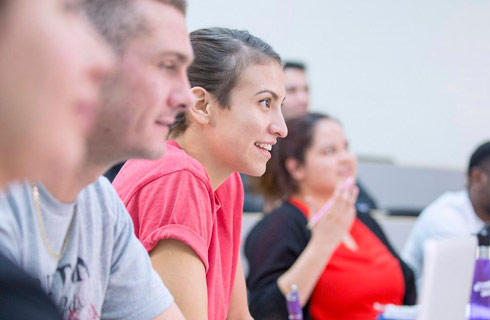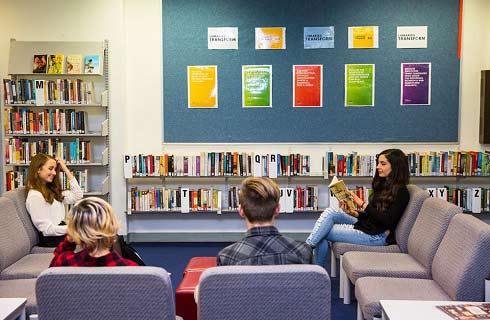社会工作硕士-系统动力学专业
Master of Social Work - System Dynamics Specialization

学历文凭
Masters Degree

专业院系

开学时间

课程时长

课程学费

国际学生入学条件
Submit a comprehensive resume or curriculum vitae.
Provide a personal statement that describes your interest in social work.
Three letters of recommendation from professional and/or academic colleagues are required. You will be asked to identify three recommenders and their contact information (including email) in the online application portal.
TOEFL: 100 iBT (600 pbt, 250 cbt)
IELTS: 7.0 overall band score
IDP—雅思考试联合主办方

雅思考试总分
7.0
- 雅思总分:7
- 托福网考总分:100
- 托福笔试总分:600
- 其他语言考试:NA
CRICOS代码:
申请截止日期: 请与IDP联系 以获取详细信息。
课程简介
Our two-year, 60-credit Master of Social Work degree prepares you with the fundamentals you need to enter the professionalfield, while providing the advanced analytical, problem-solving and team-building skills to thrive in your career. The hallmarks of our curriculum include its flexibility, evidence-based approach and anti-oppression lens. Our program is designed to prepare students to connect theory to practice, bolstered by real-world learning experiences and research opportunities.<br><br>This specialization prepares students to apply system dynamics to navigate and solve problems facing organizations and communities. The Brown School is unique in our tradition of engaging communities in St. Louis and around the world in the practice of using system dynamics to pursue community empowerment and mobilization. System dynamics are a cornerstone of rigorous systems thinking. The System Dynamics specialization allows students to bring their interests (e.g., international development, social entrepreneurship, urban education, violence against women, mental health) and learn to apply system dynamics within their practice area. Students learn methods to work with groups of stakeholders to map systems, identify and assess potential leverage points, and develop strategies for designing and evaluating sustainable programs, business models and policies. Our graduates are prepared to tackle dynamic social problems with innovative, design-drive, transdisciplinary solutions. Alumni seek high-impact positions in consulting, government, research, evaluation and the use of systems thinking in clinical and community development practice.
相关申请
 预科
预科 奖学金
奖学金 实习机会
实习机会 在校学习
在校学习 跨境学习
跨境学习 校园授课-线上开始
校园授课-线上开始 在线/远程学习
在线/远程学习
学校排名

世界排名54
数据源:
泰晤士高等教育世界大学排名
关于圣路易斯华盛顿大学

圣路易斯华盛顿大学并不是什么“分校”,而是完全独立且实力与排名秒杀西海岸那个UW的私立精英大学。其入学竞争激烈程度和哥伦比亚大学并列排名第5。相关专业学院也是排名显赫:乔治沃伦布朗社会工作学院排名全美第1,医学院排名全美第3,建筑学院排名全美第4,工程学院的生物医学工程系排名全美第12,法学院和Olin商学院排名全美第19。宿舍要比很多中产阶级的住宅还要好圣路易斯华盛顿大学提供丰富多彩的休闲活动,其毗邻森林公园的地理位置为其提供了这方面的便利。高尔夫课程,溜冰场,动物园,可划船的湖泊,艺术历史博物馆,露天剧场以及科学中心都步行即可到达。对于那些距离较远的学生活动场所,学校提供免费的班车服务。大部分宿舍都建在在一个叫做南40的地方,这块面积为40英亩的地方紧挨教学区。所有宿舍配备了空调,且为男女混住,一些校舍还有可容纳六到八人的大套间。新生都可以申请到宿舍,且可保证下一年续住成功。
本校相关课程

工程管理硕士
学历文凭
Masters Degree
开学日期
课程费用总额


项目管理研究生证书
学历文凭
Graduate Certificate
开学日期
课程费用总额


物理疗法医生
学历文凭
Ph.D.
开学日期
课程费用总额


戏剧和表演研究文学硕士
学历文凭
Masters Degree
开学日期
课程费用总额


Master of Science in Biostatistics and Data Science
学历文凭
Masters Degree
开学日期
课程费用总额


Bachelor of Arts in Environmental Policy
学历文凭
Bachelor Degree
开学日期
课程费用总额

其他相关课程

Bachelor of Social Work
 滑铁卢大学
滑铁卢大学学历文凭
Bachelor Degree
开学日期
课程费用总额


社会工作硕士
 劳伦森大学
劳伦森大学学历文凭
Masters Degree
开学日期
课程费用总额


社会工作学士(荣誉学位)
 劳伦森大学
劳伦森大学学历文凭
Bachelor Degree with Honours
开学日期
课程费用总额


社会工作学士
 达尔豪斯大学
达尔豪斯大学学历文凭
Bachelor Degree
开学日期
课程费用总额


前社会工作文学士学位
 卡莫森学院
卡莫森学院学历文凭
Bachelor Degree
开学日期
课程费用总额


社会工作硕士
 多伦多都会大学
多伦多都会大学学历文凭
Masters Degree
开学日期
课程费用总额









 美国
美国